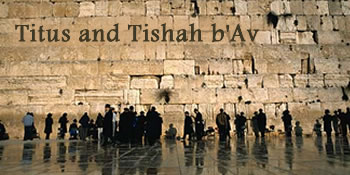
On the ninth of Av, in August 70, 1 the Romans broke into the Temple. Roman soldiers threw firebrands into the Temple building, and the supposedly fireproof building of marble, granite and stone began to burn. 2 It burned for the next thirty hours, well into the afternoon of the tenth of Av. In the smoke of the Temple, the Jewish national existence in the land of Israel was snuffed out, not to be restored for almost nineteen centuries. Th Roman soldiers gathered whatever wealth and ritual artefacts they could from the burning Temple, some of which the soldiers would divide among themselves as the booty of war, and some of which they would cart off to Rome to be paraded in Titus* triumphal procession. The Romans whooped with joy at their victory, while the Jews wept and once again set aside the ninth of Av as the day of universal Jewish lamentation. Yavneh would now have to serve in place of the Temple, and as a capital, nation and homeland. "the Judean state as a political entity was gone. All that remained was the spirit and religion of the Judeans: Judaism." 3 The Romans completed the mop-up of the country. Flavius Silva, Titus' siccessor as commander of the Roman Tenth Legion, laid siege to the Sicarii fortress of Masada.
In 72, Elazar ben Yair, the commander of Masada, and his troops chose suicide over fighting to the death or surrender, and almost one thousand Jews - men, women and children - took their own lives and left this seemingly impregnable fortress to the Romans. A major fortress on the east coast of the Sea of Galilee was another point of combat. There the Jews put up fierce resistance till the end. The Roman casualties were so heavy that the morale of the attacking legion broke. Only the direct orders of the emperor Vespasian forced them to return to the offensive and achieve ultimate victory. Every Jewish defender there was killed. By the year 73 the country was pacified, and Rome reigned supreme in the Land of Israel. Shimon bar Giora and Yochanan of Gush Chalav had been taken to Rome in chains and paraded before the howling, hooting Roman mob as part of Titus' triumph in the year 71. Shimon was publicly executed, and Yochanan died not long after in a fetid Roman prison. The great Arch of Titus was erected in Rome to commemorate the fall of Jerusalem and the Temple. The Romans minted coins and stamped them with the words Judea Capta ( " Judah is captured") to mark the defeat of the Jews. They sold hundreds of thousands of Jews into slavery, and so many Jewish slaves were available, flooding the market, in many instances there were no buyers at any price. 4 But the end of the Jewish state in no way signified the end of the Jewish people. Its God and His Torah would continue to sustain it throughout later history.
- Solomon Zeitlin, The Rise and Fall of the Judean State, Philadelphia: Jewish Publication Society, 1978, Vol. VI , p. 151.
- Fulfilling the dire biblical prediction recorded in Deuteronomy (28:68).

